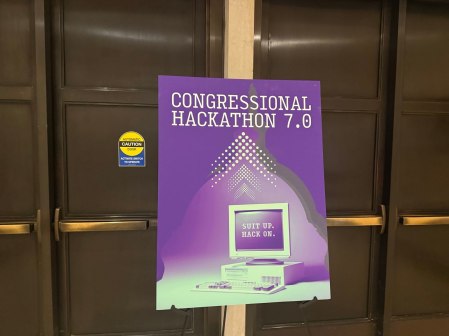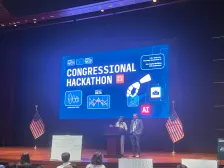House calendar, social media tracker among tools launched since last Congressional Hackathon

The Congressional Hackathon will return Thursday, once again bringing together lawmakers, staffers, and technologists for a large-scale brainstorming session on tech-driven ideas that could solve problems faced by the legislative branch.
That event, which was first held in 2011 with Facebook as an experiment, has gradually become more and more of a fixture for congressional modernization efforts, providing a launchpad for ideas like providing access to raw legislative data and digitizing casework. It’s now been held annually since 2022, and last year, formally gained institutional support from the House Office of the Chief Administrative Officer.
As the sixth hackathon gears up, the event has new progress to show for its efforts. Two of the five top recommendations from last year’s event have been implemented and others are on their way to being realized, Steve Dwyer, senior director for innovation at the CAO, told FedScoop.
“This last year has been a tremendous success. I think more has been done in this past year than any prior year,” said Dwyer, who helped spearhead the first event as a staffer for then-Democratic Whip Steny Hoyer of Maryland.
Completed items from last year’s recommendation list are an internal unified House calendar that was launched in July and an internal social media tracking tool that was announced in recent weeks by the CAO to compare lawmakers’ social media statistics, Dwyer said.
That calendar, which he said staff are using “a ton,” was a priority of the now-concluded Select Committee on the Modernization, including videos from every committee, member rosters, and schedule conflicts.
Meanwhile, the social media tracking tool allows staff to compare their social media analytics against other offices to provide context for how outreach on those platforms is doing, which was a high-demand need among staff, Dwyer said. That tool, he said, collects public statistics such as follower counts and number of posts per day and pulls them together into one place.
Projects to come
While not yet completed, the remaining three recommendations from last year are in the works, including an online staff directory for the entire legislative branch. Dwyer, who is leading that project, said the CAO has been working on that effort a lot over the past six months and expects to both demo that tool at the Thursday hackathon and pilot it in the coming weeks.
“These are ones that I’m really excited about, but they haven’t even launched yet, mostly because they’re just larger projects,” Dwyer said.
Progress is also being made on an anonymized constituent casework database, a project championed by Rep. Derek Kilmer, D-Wash., ranking member of the House Committee on Administration’s Modernization Subcommittee who is slated to speak at the event.
That tool, which was also recommended by the Select Committee on the Modernization of Congress, would aim to create an opt-in system that would use anonymized constituent casework data to identify issues and trends. Dwyer said some offices are participating in a “limited, early pilot” of that project.
Additionally, the third recommendation to create bill summaries using artificial intelligence is also in progress, though that project is being led by the Congressional Research Service. At a House hearing in March, CRS’ Interim Director Robert Newlen told lawmakers the agency was working to implement AI for legislative summaries “soon.”
Development and pilots
Success on projects this year from the 2023 hackathon is due in part to the fact that “a lot of the stars have aligned,” Dwyer said, pointing specifically to the creation of the CAO’s House Digital Service team, of which he’s a part. That group was announced in 2022 and has grown “quite a bit in the past year,” according to Dwyer.
The process of developing those tools follows a methodology focused on users, rapid prototyping, and delivering early and often, Dwyer said. While the hackathon serves as the CAO’s “biggest listening event of the year,” they also hold listening events throughout the year to get feedback, he said.
Projects start by piloting with small groups of 20 to 30 staffers that get early, exclusive access and give their feedback in exchange. The CAO collects that feedback through things like surveys and meetings in which the test users share their screens while they use the tool.
“Then we just ever expand,” Dwyer said. Pilots gradually increase to more and more staffers and the feedback and analytics continue until the CAO is ready to formally announce the project. That was the case for both the unified House calendar and the social media tracking tool.
This year
In addition to the anticipated idea-swapping, the Thursday event is expected to feature remarks by Speaker Mike Johnson, R-La., Democratic Leader Hakeem Jeffries, N.Y., and House Chief Administrator Catherine Szpindor.
Johnson is expected to address the country’s technological competitiveness against geopolitical adversaries, such as China, according to prepared remarks his office shared with FedScoop. “This is an exercise to protect America’s place in the world, and I’m grateful for your role in it,” Johnson’s remarks state.






